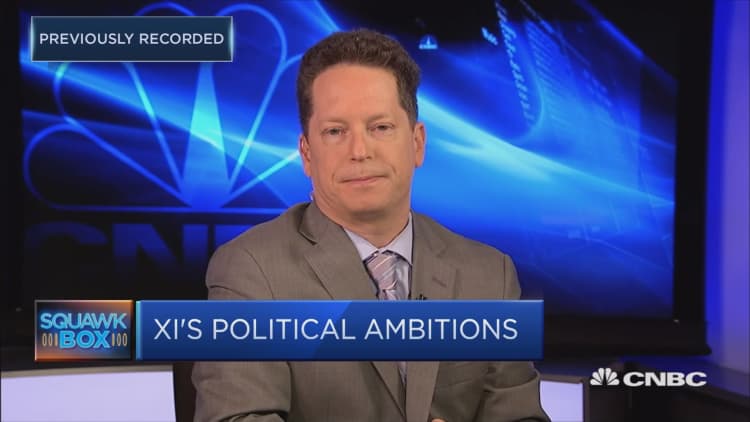
China's President Xi Jinping is heading into an annual parliament meeting with a tighter grip on power than ever, as he sets to implement big plans for the world's second-largest economy now that he is primed to rule for life.
The National People's Congress (NPC) meeting kicked off on Monday morning with Premier Li Keqiang announcing a 2018 growth target of around 6.5 percent.
For the next two weeks, the large rubber-stamp parliament will move on to pass major bills, approve the budget and endorse personnel nominations.
The immediate lead-up to this year's NPC was eventful, with China proposing the scrapping of presidency term limits and the state seizure of Anbang Insurance Group. The moves indicate greater central oversight of key functions in the world's second-largest economy, observers said.
"This is the most consequential 'Two Sessions' that China has had in many a year," said Scott Kennedy, deputy director of the Freeman Chair in China Studies at the Center for Strategic and International Studies.
This year's meeting will address major issues including the solidifying of Xi's power, and reworking the bureaucracy to put the Chinese Communist Party in control. These will also include putting Xi's allies in place, and emphasizing industrial policies as well as the Belt and Road project.
All this shows that Xi "has a plan and a big plan" that will be discussed on end for the next few weeks in China, Kennedy told CNBC.
"The new equation in China is what's good for Xi is good for the party, and what's good for the party is good for China and what's good for China is good for the world — all one thing connected," Kennedy added.
The NPC meeting is part of the so-called annual "Two Sessions" season as it runs concurrently with a meeting of the Chinese People's Political Consultative Conference — however, this advisory body has no legislative power.
Here's what's the NPC is ushering in:
Economy
Like previous years, Premier Li Keqiang announced annual economic targets in a state-of-the-nation style address on Monday.
As expected, Li said China is targeting growth of around 6.5 percent this year. The country is also expecting a budget deficit of 2.6 percent of gross domestic product this year.
The growth target in 2018 was similar to that in 2017, which China topped with full-year growth coming in at 6.9 percent.
China will also keep monetary policy neutral and deepen reforms in foreign exchange and interest rates, Li added.
Leadership
It's all but official that President Xi – that proposal still has to be ratified during the NPC meeting – will be able to rule China for life.
This will allow Xi to line up allies and loyalists in the top brass, with two names in focus.
Wang Qishan, who has reached retirement age, stepped down from the top echelons of Chinese leadership last October. However, he was elected as a delegate to the NPC in January, spurring speculation of a political resurrection. The former top graft-bust and Xi ally is widely expected to assume vice presidency and focus on handling U.S.-Sino relations.
The NPC meeting this year takes place under the cloud of heightened trade tensions as U.S. President Trump announced he will impose heavy duties on steels and aluminium imports.
Economic adviser Liu He, a Harvard-trained economist and trusted Xi confidant, is tipped to become a vice premier in charge of economic and financial issues. He is also a front runner for the position of the next People's Bank of China (PBOC) governor.
Managing risks
China has been battling high debt levels and asset bubbles for years. With Xi's firm grip on power and his administration's heavy-handed approach to controlling financial risks, it'll be harder for companies to push limits beyond what Beijing is comfortable with, observers said.
Investments that support national policies will still be supported, but excessive money flowing out of the country will be more than frowned upon.
"The party always had the final say in investments, but they want the first say in investments now abroad and they want those investments to support industrial policy or the Belt and Road [Initiative]. If not, they want folks to keep that money in China ," Kennedy said.
There are talks of a super-regulator to manage the regulation of banking and insurance industries, and putting economic adviser Liu at the helm of the People's Bank of China will also aid economic transformation.
"This is against the backdrop of much bigger play that's hugely positive for China. Putting the economic mastermind as the PBOC governor actually starts the process of moving it out from the central government," said Brett McGonegal, chief executive of Capital Link International, a financial services firm.
This will set into motion the process of separating the central bank from the government, giving the PBOB ultimate independence to realize the "ultimate goal" of positioning the as an international reserve currency, McGonegal added.
"It doesn't happen overnight. These steps do take time but the most important thing is if you've a well thought out plan, you're deleveraging and you put the crowd favorite in at the helm of the job to create this independent group to start doing it," McGonegal told CNBC, adding that this process will gain "western acceptance" to move from vision to reality.

